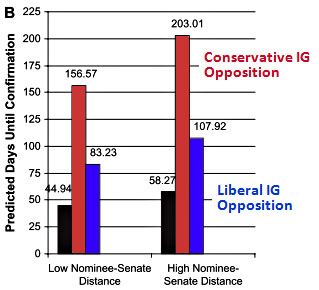 In my previous post, I wrote that Republicans are now blocking not just judicial nominees who are relatively extreme, but anyone who’s ever written something that a conservative interest group objects to. Matt Corley tweets that this reminds him of a paper written a few years ago on exactly this subject.
In my previous post, I wrote that Republicans are now blocking not just judicial nominees who are relatively extreme, but anyone who’s ever written something that a conservative interest group objects to. Matt Corley tweets that this reminds him of a paper written a few years ago on exactly this subject.
Nancy Scherer, Brandon Bartels, and Amy Steigerwalt took a look at what factors were most likely to hold up a judicial nominee in the Senate. Their data spans the years from 1985 to 2004 and their conclusion is pretty simple: it’s interest groups uber alles. Take a look at the chart above. On the left, you see what happens to judicial nominees when they’re ideologically in sync with the Senate. If interest groups don’t weigh in (black bar), they get approved in an average of 44 days. When conservative interest groups are opposed, this skyrockets to 156 days. When liberal interest groups are opposed, it takes 83 days.
What’s interesting is that this doesn’t change much when the nominee is ideologically distant from the Senate. When interest groups don’t raise alarms, nominees take only slightly longer to get confirmed: 58 days instead of 44. It’s interest group opposition that sends this through the roof. Senators don’t really care that much how extreme a candidate is. They only care if their own interest groups sound the alarm.
What seems to be happening now is that interest groups always sound an alarm and this is slowing judicial confirmations to a standstill across the board. Interest groups—especially conservative ones—rule us all.



















